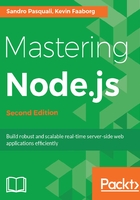
Callbacks
Luckily, Node creators agreed upon sane conventions on how to structure callbacks early on. It is important to follow this tradition. Deviation leads to surprises, sometimes very bad surprises, and in general, to do so automatically makes an API awkward, a characteristic other developers will rapidly tire of.
One is either returning a function result by executing a callback, handling the arguments received by a callback, or designing the signature for a callback within your API. Whichever situation is being considered, one should follow the convention relevant to that case.
The first argument returned to a callback function is any error message, preferably in the form of an error object. If no error is to be reported, this slot should contain a null value.
When passing a callback to a function, it should be assigned the last slot of the function signature. APIs should be consistently designed this way.
Any number of arguments may exist between the error and the callback slots.
To create an error object: new Error("Argument must be a String!")